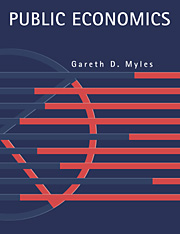Book contents
- Frontmatter
- Contents
- List of figures
- List of tables
- Preface
- Part I Foundations
- 1 Introduction
- 2 General equilibrium and welfare economics
- 3 Topics in measurement
- Part II Analysis in the competitive economy
- Part III Relaxing the assumptions
- Part IV Introducing real time
- References
- Author index
- Subject index
2 - General equilibrium and welfare economics
Published online by Cambridge University Press: 05 June 2012
- Frontmatter
- Contents
- List of figures
- List of tables
- Preface
- Part I Foundations
- 1 Introduction
- 2 General equilibrium and welfare economics
- 3 Topics in measurement
- Part II Analysis in the competitive economy
- Part III Relaxing the assumptions
- Part IV Introducing real time
- References
- Author index
- Subject index
Summary
INTRODUCTION
The competitive general equilibrium economy described in this chapter has been developed over a considerable period of time and has been subjected to closer study than any other form of economy. The earliest formal construction is generally attributed to Walras (1874) and this was developed in the German literature of the 1930s. These developments reached maturity in the seminal contribution of Arrow and Debreu (1954) and in the monograph by Debreu (1959); hence its common title of the Arrow–Debreu economy. The importance of the Arrow–Debreu contribution was the demonstration that an equilibrium existed for the economy under reasonable assumptions and the formal elaboration of the welfare properties of equilibrium. This chapter provides an informal but self-contained introduction to the Arrow–Debreu general equilibrium economy. The discussion emphasises those aspects of the economy that are most relevant to the study of public economics. Technical aspects of the economy that are not strictly necessary for later analysis will be noted but, where there is no harm from doing so, will not be discussed in detail. Formal treatments of the issues dealt with here can be found in Arrow and Hahn (1971), Debreu (1959) and Hildenbrand and Kirman (1988).
The Arrow–Debreu economy is studied for two primary reasons. Firstly, it provides the analytical foundation for the economies analysed in later chapters which are often simplifications or modifications of the general framework.
- Type
- Chapter
- Information
- Public Economics , pp. 18 - 58Publisher: Cambridge University PressPrint publication year: 1995



